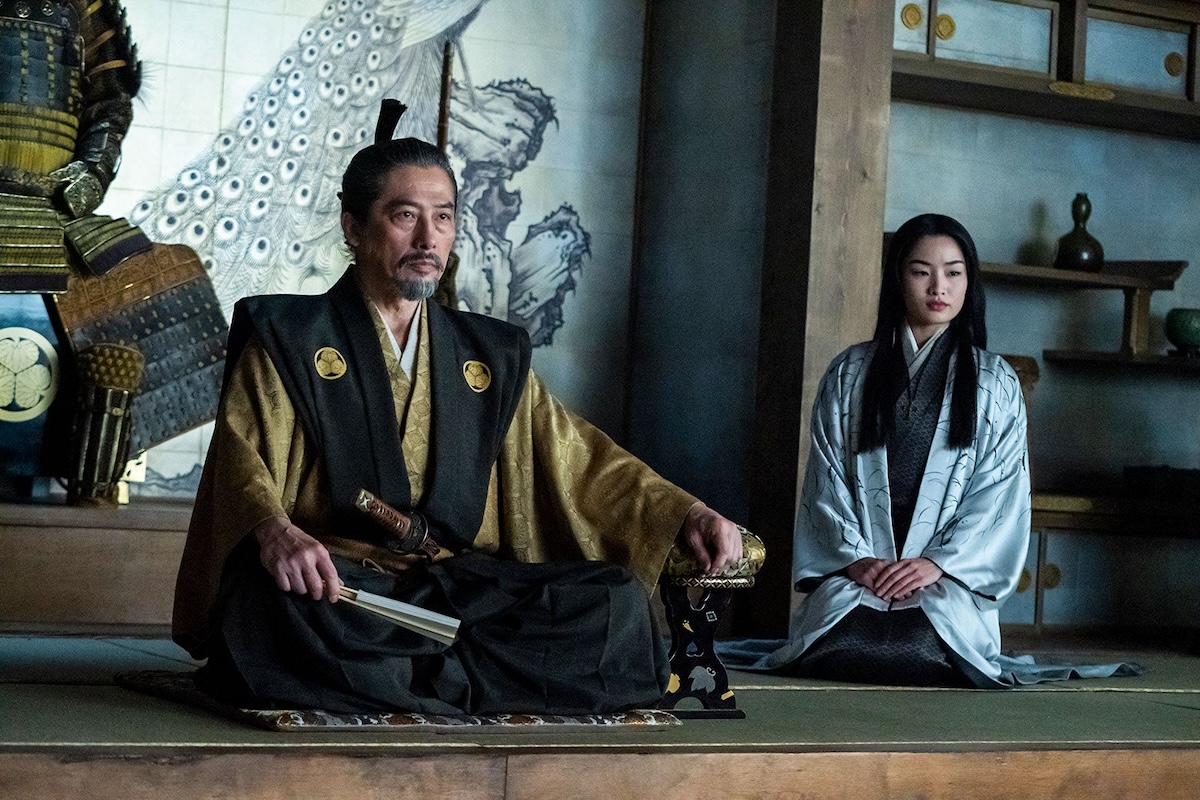Based on the 1975 novel of the same name (adapted before in 1980), Shogun is a 10-episode miniseries set in 1600s Japan and follows multiple characters from multiple points of view as they vie for power and pursue their personal agendas. Chief among these are John Blackthorne (based on real-life English navigator William Adams), a risk-taking English sailor who ends up shipwrecked in Japan; Lord Toranaga (based on real-life Shogun Tokugawa Ieyasu), a powerful lord and master manipulator in a deadly game of wits with his political rivals; and Lady Mariko, Lord Toranaga’s loyal subject and the person at the center of his plans for supremacy.
Shogun largely lives up to its frequent comparisons to Game of Thrones and Succession for being a show about high-stakes social and political intrigue. The series opens with the ruler dead and his son still too young to take the throne. The council of regents the late lord had set up to rule in his stead tries to kill fellow regent Lord Toranaga to ensure he won’t seize power. Lord Toranaga, to save his life, uses trickery and takes advantage of the intricate layers of Japanese honor culture to save his life and establish himself as the undisputed master of the land—the Shogun.
Blackthorne finds himself in a hostile land where he doesn’t know the language, and the few who do are Portuguese Catholics who want to kill him to keep British Protestants back home from finding out about Japan and becoming competitors with them for Japanese goods. So he also has to play the game of keeping himself valuable to any and every faction just to stay alive. Lady Mariko becomes his translator, and her growing relationship with Blackthorne complicates her loyalty to Lord Toranaga and her husband, Buntaro.
Arguably Shogun’s biggest strength is its old-fashioned sincerity. It’s a story of forbidden love treacherous backstabbing, noble warriors who believe in honor, and everything else we love in historical samurai tales, and it wears all these elements shamelessly on its sleeve. Mariko particularly believes in the honor of her family and honor to her lord, and never wavers from it. When someone like Blackthorne challenges her commitment to her loyalty to her lord and her family’s honor, even ahead of her own life, she wrestles with his words, but ultimately stays committed to her beliefs. In an age of Marvel movies, where sincerity would constantly be undercut by a joke or pop culture reference, a show that lets its serious principles rest without being embarrassed by them is deeply affecting.
Even the cynicism in the story is a serious rather than a humorous one, meant to underscore the hypocrisy of characters who claim to be pious but live for money or question the point of honor in the face of death. The show also points a finger at the pettiness of the conflict between Protestants and Catholics—particularly calling out Blackthorne, who hates Catholics with a Protestant prejudice, even though he isn’t sure he believes in Jesus at all—and the people on the council of regents who claim to be Catholic but whose loyalty to the church is largely because it enriches them.
The aesthetics are also a strong component of the show’s appeal. The camera framing includes a lot of wide shots that sit a bit longer on the scenery than you’d experience watching your average show, allowing the viewer to take in the misty, lavish environments of Japanese cities and countryside. In addition, the slow pace of the cuts and the subdued sound mixing give a sense of sacred stillness to the events of the story. Whether the characters are talking, thinking to themselves, even engaged in bloody violence, this quiet increases the sense of solemnity.
Where the show falters, however, is in pulling the disparate narrative threads into an emotionally powerful whole. The show wrestles with many themes but doesn’t dig deeply into any of them. Whether it’s the East vs. West theme, belief vs. cynicism, growing friendships between people of different cultures, or the pointless divisions between religions, most of these conflicts are rather superficial, and therefore the sought-for catharsis is weaker than it might have been.
For example, one subplot in Shogun is how Blackthorne begins the tale as an adventuring Englishman but slowly embraces Japanese culture. And yet the show is rarely clear what parts of Western culture Blackthorne embraces and what parts he always diverged from (he explicitly admits that he’d rather be adventuring than home with his wife and family and, again, is only halfway certain about his faith). It’s also unclear what specific traits from his culture he’s exchanging for those of Japan. We see this in a late scene: Blackthorne meets up with his men after being separated for most of the show. He says that “my people are strange to me” now, and yet, while this reunion ends in a fight, his supposed cultural transformation never really makes itself felt. The sum of the cultural divide between him and an old crewmate is described by Blackthorne merely as “He stinks.”
Other subplots suffer from this problem, too. Blackthorne the quasi-Protestant and a Catholic priest muse about the divisions between their faiths possibly ending one day. And yet Blackthorne’s faith itself is always in question–as are the real differences between the Christian communions—so none of this hoped-for reconciliation carries much emotional weight. Likewise, the story seems to be building a friendship between Blackthorne and Lord Toranaga, and yet nothing substantial materializes.
The strongest and most consistent plotline is the forbidden romance between Blackthorne and Mariko. They bond over wanting to be free from their duties but are both conflicted over whether it’s better to live for yourself (Blackthorne) or to live a life of self-sacrifice (Mariko). Here is the emotional crux of the series. But Blackthorne is never given an opportunity to act on his change in values so we can see how Mariko’s commitment to her ideals changes him.
Some of this weakness is due to the novel. The creators of the show have openly stated that the ambiguous ending of the novel is something they wanted to preserve in the TV adaptation. So if the original novel felt anticlimactic to you, the show is not going to change that. Yet the novel also had more time to develop the internal growth of its characters to make the journey more emotionally rich.
In many ways, Shogun’s shallowness in dealing with its themes is partly a reflection of the shallowness of modern cultural understanding of those same themes. Fewer and fewer people in the West have a deep acquaintance with the ideas that animate Western civ—of what the theological differences are between Protestants and Catholics and why they matter, for example, or the differences between Eastern and Western philosophies. In such an environment, it would be difficult for any filmmaker to pull off an entertainment that explored those themes with great depth. And if he did, it would require more work to help the modern audience understand them than it would have in times past.
The late literary critic and Yale Sterling Professor of Humanities Harold Bloom once bemoaned the lack of familiarity with the great books among the students in his classes:
I’ve learned in the last 15 years not to assume anything. Unless students are religious, I can’t take the Bible for granted. I can’t say “This has some relation to the Book of Job” because they might not know what that is. I can’t assume they’ve read Chaucer, either. And it’s very hard to get started on Shakespeare if you haven’t read Chaucer. It used to be that you could be pretty sure that either on their own or in a good secondary school they would have read “The Iliad” or “The Odyssey.” Not anymore. Now you have to send them to read it, along with “The Canterbury Tales” and the Book of Job. They’ll go, of course, and they’ll read it. And they’ll grasp it immediately. They’re just as bright as always. But shouldn’t they know it already?
In many ways, losing the thread in our cultural conversation puts us in the place of Shogun’s John Blackthorne: adrift in a world we don’t understand, we find ourselves at the mercy of those who understand the world better than we do, a pawn in their games. Like him, it’s up to us to learn what we need to get on in this world so we can gain some sort of agency over our lives. Hopefully, it will work out better for us than it does for him.
Shogun is solid entertainment for anyone who wants to enter a world where honor is valued and heroism is both challenged and taken seriously. But if you want to go deeper with those ideas, say, gain real emotional catharsis from the characters’ cultural and emotional odysseys, lower your expectations. Then pick up some Chaucer.

